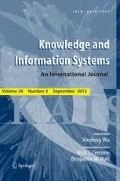Abstract.
Inductive logic is a research area in the intersection of machine learning and logic programming, and has been increasingly applied to data mining. Inductive logic studies learning from examples, within the framework provided by clausal logic. It provides a uniform and expressive means of representation: examples, background knowledge, and induced theories are all expressed in first-order logic. Such an expressive representation is computationally expensive, so it is natural to consider improving the performance of inductive logic data mining using parallelism. We present a parallelization technique for inductive logic, and implement a parallel version of a core inductive logic programming system: Progol. The technique provides perfect partitioning of computation and data access and communication requirements are small, so almost linear speedup is readily achieved. However, we also show why the information flow of the technique permits superlinear speedup over the standard sequential algorithm. Performance results on several datasets and platforms are reported. The results have wider implications for the design on parallel and sequential data-mining algorithms.
Similar content being viewed by others
Author information
Authors and Affiliations
Additional information
Received 30 August 2000 / Revised 30 January 2001 / Accepted in revised form 16 May 2001
Rights and permissions
About this article
Cite this article
Skillicorn, D., Wang, Y. Parallel and Sequential Algorithms for Data Mining Using Inductive Logic. Knowledge and Information Systems 3, 405–421 (2001). https://doi.org/10.1007/PL00011676
Issue Date:
DOI: https://doi.org/10.1007/PL00011676




